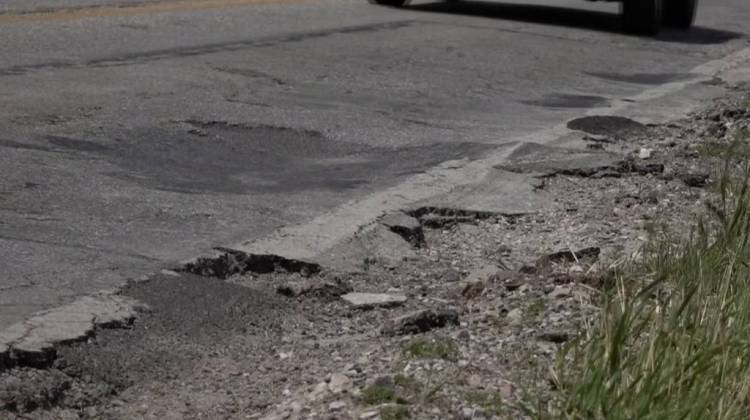
The Indianapolis Indians are one of only 30 Triple-A minor league teams across the country. Players at that level make a base salary of up to $14,000 per season ($700 per week) after a 2021 pay bump — just barely above the federal poverty line.
Lauren Chapman/IPB NewsIndiana is home to three minor league baseball teams directly affiliated with the major leagues. On Tuesday, the Major League Baseball Players Association officially asked the MLB to voluntarily recognize a minor league players union.
The request comes within a week of the MLBPA starting to collect union authorization cards from players. Already a “majority” have signed on. If the league does not willingly recognize the bargaining unit, the association could move forward with an official vote. A successful vote would force the MLB to collectively bargain with the players.
The Indianapolis Indians are one of only 30 Triple-A minor league teams across the country. Players at that level make a base salary of about $14,000 per season ($700 per week) after a 2021 pay bump, according to the AP.
Players in lower-class teams can make as little as $500 per week. The South Bend Cubs and Fort Wayne TinCaps are both High-A, the second lowest of four categories. The salary gets even lower at about $400 a week, the AP reported, for players in "rookie" and short-season teams, like the Gary SouthShore Railcats and Evansville Otters.
“Suddenly you realize that we're not approaching anything resembling a living wage until you get maybe to Triple-A and then depending on where your Triple-A team is located that may or may not actually be livable,” said Kathrine Walden, assistant teaching professor of American studies at the University of Notre Dame. Her research partly focuses on labor in sports.
The Triple-A player salary is less than $500 over the 2022 federal poverty level for individuals and is about half of the minimum salary an individual needs to live in the Indianapolis metro area, according to the MIT living wage calculator.
The system doesn’t work for most players “unless you come from family resources that support you as you try to make this career,” Walden said. “Or you're signed in an early round and have a signing bonus that you can lean on and leverage and theoretically use to finance your first couple of years or trying to make your way through.”
Many players are South and Latin American immigrants who lack such support, she said.
Minor leaguers could work other jobs outside of the five-month season, but Walden said that creates an uneven playing field.
“There's this idea, especially around the minor leagues, that it's a meritocracy. That the guys who have the talent, who work hard enough who pay their dues, are going to rise to the top,” Walden said. “It's so not a meritocracy if some people get to train year-round and other people have to work multiple jobs to be able to make ends meet for the next season.”
Join the conversation and sign up for the Indiana Two-Way. Text "Indiana" to 73224. Your comments and questions in response to our weekly text help us find the answers you need on statewide issues.
In 2018, Congress passed the Save America’s Pastime Act which exempted minor leaguers from federal minimum wage requirements. That halted part of a 2014 lawsuit against the league for violating wage law, but the suit is still ongoing based on state minimum wage requirements.
About 90 percent of people playing professional baseball are in the minor leagues, according to Walden. The minors primarily serve as a pool for major league teams to pull new players from, she said, so the idea of the players in both leagues being organized under the MLBPA makes sense.
While Walden said she is excited by the prospect of this union, she’s cautious about how successful the effort will actually be if MLB refuses to voluntarily recognize it.
“I think we're in for a very public case study in the fact that labor organizing is messy,” Walden said.
In 2021, Advocates for Minor Leaguers shared stories of players using most, if not all, of their paychecks for housing “with a common arrangement being six players sleeping on air mattresses in a two bedroom apartment.”
The #FairBall campaign led to the “first-ever labor victory for Minor League players.” Team owners agreed to provide free, furnished housing.
When the MLBPA announced it was starting to collect union authorizations from minor league players last week, it also hired the full Advocates for Minor Leaguers staff to help run the unit.
“This generation of Minor League players has demonstrated an unprecedented ability to address workplace issues with a collective voice,” said Harry Marino, former executive director of Advocates for Minor Leaguers in a statement. “Joining with the most powerful union in professional sports assures that this voice is heard where it matters most – at the bargaining table.”
Contact reporter Adam at arayes@wvpe.org or follow him on Twitter at @arayesIPB.
9(MDAyMzk1MzA4MDE2MjY3OTY1MjM5ZDJjYQ000))
 DONATE
DONATE






 Support WFYI. We can't do it without you.
Support WFYI. We can't do it without you.